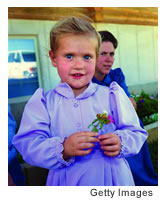by Dr. Jerald Joersz and Dr. Kurt Senske

Mormon fundamentalists today adhere to the “doctrine of plural marriage” (polygamy). They accuse the Church of Jesus Christ of Latter-day Saints (LDS) of abandoning the true teaching of LDS founders and official scriptures. Typically, they point to Section 132 of The Doctrine and Covenants, a normative source for Mormon teaching.
This section records a revelation allegedly received in 1843 (publicly announced in 1852) that speaks of plural marriage as “the most holy and important doctrine ever revealed to man on earth.”
This teaching, in fact, remained official Mormon doctrine until 1890. In October of that year the fourth president and “prophet” of LDS, Wilford Woodruff, claimed to have received a divine revelation mandating that LDS no longer permit polygamous marriages.
Some historians argue that state pressures and active measures to criminalize and remove polygamy from U.S. society prompted this change. The LDS soon officially upheld the “Woodruff Manifesto.” Following a “Second Manifesto” in 1904 reaffirming its opposition to polygamous unions, LDS began to excommunicate polygamists.
Resistance grew among those who considered plural marriage ordained by God. As a result, numerous fundamentalist sects split off from the Mormon Church. Some excommunicated polygamists became leaders of these groups and claimed divine revelations saying they were right in opposing the LDS.
The Fundamentalist Church of Jesus Christ of Latter-day Saints (FLDS), the largest of the newly formed groups, was organized in the early 1950s. Its leaders have continued to teach that the LDS has committed apostasy by abandoning plural marriage, which they regard as a divine arrangement deeply rooted in LDS history and doctrine. They insist that they alone remain true and righteous Mormons.
Mormon polygamous sects such as the FLDS believe spiritual benefits are attached to having multiple wives, including a higher level of salvation. The leader or prophet, by revelation, assigns women of marriageable age to men counted worthy to receive them. Children from plural marriages, called “covenant children,” according to one source, “help usher in the millennium and pave the way for the biblically-predicted return of Jesus Christ.”
Polygamous relationships are a crime in all 50 U.S. states. Mormon fundamentalists, however, seek to avoid violation of state laws prohibiting polygamy by becoming legally married to the first wife, and “spiritually married” to future wives. Community life within FLDS compounds— such as the recently raided Yearning for Zion Ranch in Eldorado, Texas—is often shrouded in secrecy. This sometimes makes laws governing illicit conduct more difficult to enforce.
By Jerald Joersz
What about the Children?
We are called by law and by Christ to respond to abuse.
The recent raid on the Fundamentalist Church of Jesus Christ of Latter-day Saints compound in Eldorado, Texas, has brought to the forefront the differences between institutionalized abuse and religious practices.
 It also brings up the question of how we as Christians and citizens respond when we suspect physical, sexual, or emotional abuse of children.
It also brings up the question of how we as Christians and citizens respond when we suspect physical, sexual, or emotional abuse of children.
All states have laws that require citizens to report suspected cases of child abuse. The reason behind these laws is clear: Children are vulnerable and unable to speak up for themselves. Victims of abuse, especially children, often don’t realize that they are victims. They believe that the physical, emotional, or sexual abuse they are subjected to is normal.
Unless someone intervenes, the cycle of abuse continues from one generation to the next with significant ramifications for its victims, who often engage in destructive and antisocial behaviors. Matthew tells us how we should respond as Christians. “I tell you the truth, whatever you did for one of the least of these brothers of mine, you did for me” (Matt. 25:40 NIV). We are called to offer compassion to those in need and to seek justice for those who are oppressed. We are called to protect children from abuse.
When we encounter possible abuse, the situation can make us feel uncomfortable, especially when the lines between parental discipline and abuse are blurry. We can be reluctant to notify authorities of our suspicions because we know that our actions might cause difficulty for others. But it is incumbent upon us when we see potential abuse that we search our hearts and minds to discern what earthly laws and our faith tell us and to act in the best interests of the child. Most states have laws protecting a reporter if the report is made in good faith and the allegations are later determined to be unfounded.
While vigilance in protecting children from abuse and reporting is important, I urge you to make a deeper commitment. I encourage you to prayerfully consider opening your hearts and homes to abused, neglected, and unwanted children. Christ calls each of us to actively help those in need, not just sit on the sidelines. Many Lutheran social ministries, including Lutheran Social Services of the South, have foster-care and adoption programs in which we fulfill God’s will to serve children who come from homes where abuse and neglect are ways of life. Thousands of children in our country and from around the world who have never heard of our Lord and Savior need loving homes. Heed the call of James and “look after orphans and widows in their distress” (1:27).
Our earthly laws and our faith call us to respond to those in distress, especially vulnerable children. When we actively show love and support to those in need, we embody God’s message of love in Christ.
To contact the Lutheran social ministry near you, please visit Lutheran Services in America at www.LutheranServices.org or call (800) 664-3848. For information about the signs of child abuse and what you can do to prevent it, please visit Prevent Child Abuse www.preventchildabuse.org or call (312) 663-3520.
By Kurt Senske





